Green Healing With Stress-Relieving Plants
Stress-Relieving Plants : Cultivating Serenity

Introduction: For many of us, stress has become an unwelcome acquaintance in the constant hustle and bustle of our frantic lives. The good news is that nature can offer our tired hearts a tranquil salve. Stress-relieving plants have distinctive features that can help you relax and feel less anxious, in addition to being aesthetically beautiful. We’ll provide a list of the top alleviating plants in this article that could turn your dwelling into a peaceful cocoon.
Philodendron:

A philodendron is an outstanding choice for an alleviating plant. It is a multipurpose houseplant that is renowned for its stunning colors and air-purifying capabilities.
Benefits of Philodendron over Stress Relief:
- Air Purification: The abilities of philodendrons to eliminate indoor air pollutants such as formaldehyde, xylene, and toluene have been extensively tracked. Your entire well-being and aptitude to cope with stress could reap benefits from clean air.
- Low Maintenance: These plants are ideal for beginners or any individual with a hectic schedule because they require little maintenance. You should not worry about periodic oversight since they have forgiving and robust traits.
- Aesthetic Appeal: Philodendrons appear in an assortment of sizes and forms, from compact, bushy species to trailing vines. Your indoor environment acquires a touch of the influence of nature courtesy of its abundant green foliage, which can create a relaxing and aesthetically pleasing impact.
- Indoor Greenery: Indoor greenery has been displayed to mitigate stress and provide a sense of serenity. Phlox are a good example of indoor greenery. Their presence might assist with calming the tone in your house.
- Positive Psychological Effects: Several studies have shown that interacting with indoor plants, including philodendrons, can have positive psychological effects, such as reducing stress and anxiety and even improving mood.
Maintaining Philodendrons:
- Light: Bright, indirect light is optimal for philodendron growth. They shouldn’t be exposed to direct sunlight since it can scorch their leaves. If you see thin growth, think about getting a little bit more light.
- Humidity: Philodendrons prefer deeper humidity levels, despite the fact that they can survive lower humidity settings. By spraying the plant’s leaves or putting a humidity tray adjacent to it, you can boost the humidity.
- Watering: When the top inch or two of the soil feels dry, water your philodendron. They can endure brief droughts, but they like barely wet soil. It’s crucial to let the soil dry out between waterings since overwatering may lead to root rot.
- Temperature: The optimal range of temperatures for these plants is between 65°F and 80°F (18°C and 27°C). Avoid exposing them to temperature extremes or drafts.
- Fertilization: During the growing season (spring and summer), fertilize your philodendron with a harmonious, diluted liquid fertilizer roughly once a month. During the winter months, when plants are dormant, reduce or stop fertilizing.
- Pruning: To promote robust growth and retain the plant’s intelligence, regularly prune dead or yellowing leaves.
- Repotting: every two to three years, or as soon as your philodendron exhibits root-boundness, repot it. Use a potting mix that drains efficiently.
In summary, A philodendron can function as an ongoing signal for you to take time to look after both your wellbeing and the beauty of nature. As you take care of and see your philodendron develop, it may transform into a useful and attractive addition to your home, assisting you in reducing anxiety and discovering peaceful times during the day.
JATAMANSI PLANT:
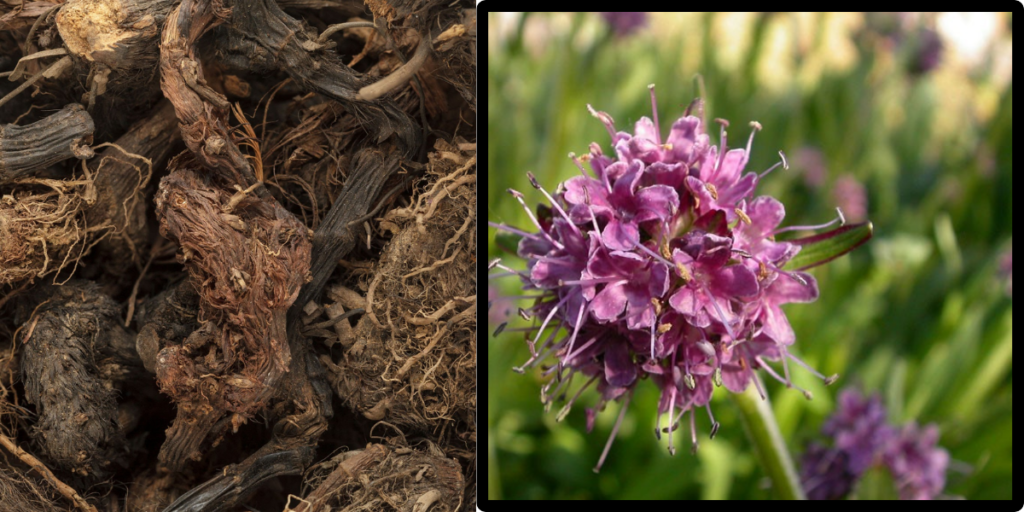
The species of plant Jatamansi (Nardostachys jatamansi), frequently referred to as either Muskroot or Spikenard, is considered a miracle worker in Ayurveda, the traditional Indian healing approach. It has been applied for millennia to reduce tension and anxiety and advance mental health. Jatamansi is regarded as an adaptogenic herb, which means it aids in the body’s ability to deal with stress while preserving its equilibrium.
Jatamansi can be used as a stress-relief plant.
- Anxiety Reduction: Jatamansi is particularly renowned for its ability to soothe the mind and diminish the signs of worry. It has a calming impact on the cognitive system, making it helpful for individuals who are nervous, anxious, or have racing thoughts.
- Healthier Sleep: Jatamansi is frequently applied to enhance the quality of sleep. It has a sedative effect that might assist those who battle with drowsiness or have restless thoughts before bed.
- Cognitive Function: Jatamansi claims to strengthen recall and concentration by boosting mental abilities. It can aid in improving mental clarity and concentration, which is particularly helpful in stressful circumstances.
- Emotional Balance: Jatamansi is said to have an emotional balancing effect. It may foster emotional endurance and ease mood oscillations.
- Stress Management: By reducing stress and anxiety, Jatamansi helps manage the physical and emotional effects of chronic stress. It promotes a sense of emotional well-being and relaxation.
- Nervous System Support: Jatamansi supports the overall health of the nervous system, making it a valuable herb for those dealing with stress-related disorders.
How you can use Jatamansi for stress relief:
- Essential Oils: Jatamansi essential oil is also a viable option and is suitable for aromatherapy. For relaxation, diffuse it across your dwelling, add a few drops to a warm bath, or dilute it with a carrier oil and use topically (be sure it’s appropriate for skin usage).
- Herbal Teas: Jatamansi root can be used to make herbal teas. Simply steep dried Jatamansi root in hot water for a soothing and calming beverage. You can add honey or other herbs like Tulsi for added benefits.
- Supplements: Jatamansi supplements, which come in a variety of forms, including capsules or tinctures, can be taken following instructions from a physician. Before initiating any herbal supplement, especially if you are using another medication, you need to consult with a healthcare expert.
- Herbal Preparations: Jatamansi sometimes appears in Ayurvedic herbal formulations and preparations aimed at relieving anxiety and stress.
In summary, Jatamansi may help reduce nervousness, but it’s vital to keep in mind that individuals react to herbs slightly. To make sure Jatamansi is appropriate for specific needs and circumstances, it is advisable that you communicate with a certified Ayurvedic practitioner or healthcare professional while taking it as part of your stress management plan. Always adhere to dose recommendations while additionally keeping an eye on how the herb is affecting you.
BRAHMI:
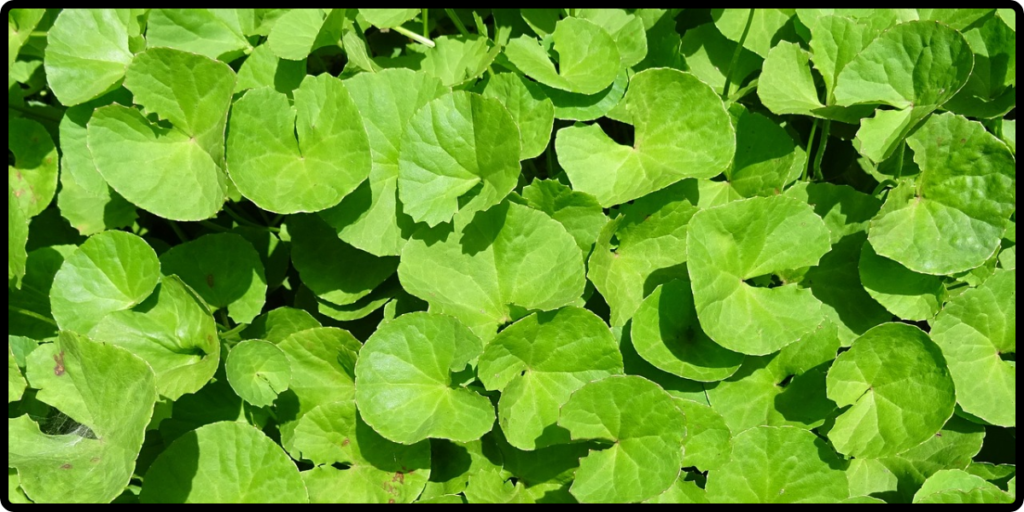
An Ayurvedic herb known as Brahmi (Bacopa monnieri), usually referred to as Water Hyssop or Indian Pennywort, is being proven to have potent stress-relieving and cognitive-improving qualities. This plant has been used for ages in conventional Ayurvedic therapy to ease stress while promoting mental health.
Brahmi can be used as a stress-relief plant.
- Anxiety Reduction: Brahmi is well known for its anxiolytic (anxiety-reducing) abilities. It has an unwinding impact on the mind and is often employed to treat anxiety and phobia symptoms.
- Enhanced Cognitive Function: Brahmi is a nootropic plant, which means it may improve cognitive performance. It makes it simpler to regulate stress while retaining mindfulness by enhancing memory, concentration, and overall cognitive function.
- Stress Management: By reducing anxiety and enhancing cognitive function, Brahmi aids in managing the mental and emotional aspects of stress. It helps promote a sense of mental tranquility and emotional balance.
- Adaptogenic Properties: Brahmi is an adaptogen, which means it helps the body adapt to stress and maintain balance in various physiological processes.
- Sleep Improvement: Some people discover that Brahmi helps them achieve better-quality sleep, especially after stress or racing thoughts make it difficult for them to catch up and sleep.
- Neuroprotective Effects: Brahmi consists of neuroprotective compounds that may help shield brain tissue from oxidative stress and trauma. The long-term health of the brain could benefit from this.
- Mood Stabilization: Brahmi is thought to have a mood-stabilizing effect, making it helpful for individuals who endure turbulent emotions and mood swings.
- Nervous System Support: Brahmi supports the overall health of the nervous system, which can be particularly beneficial for individuals experiencing stress-related disorders.
How you can use Brahmi for stress relief:
- Brahmi Tea: To create Brahmi tea, soak dried Brahmi leaves in simmering water for a few moments. Regular usage of this herbal tea may result in relaxing and cognitive-improving benefits.
- Brahmi Oil: Made from the plant, this oil may be applied topically to the scalp to enhance mental clarity and relaxation. When applied to the scalp, it is said to aid in relieving stress and improving sleep.
- Brahmi Supplements: Supplements featuring brahmi are accessible in a number of formats, including capsules, pills, and liquid extracts. Use the suggested dosage shown on the product case or seek advice from a physician.
- Ayurvedic Formulations: In Ayurveda, Brahmi is often used as part of herbal formulations designed to promote mental well-being and alleviate stress.
In summary, Before using Brahmi or any other herbal supplement, as with any herbal counseling, you ought to seek the advice of a competent healthcare professional, especially if you are pregnant, nursing, or on any medications. Brahmi can be a useful supplement to any stress-reduction strategy, but it’s crucial to use it effectively and in the ideal amount for your particular needs.
SHANKHPUSHPI:
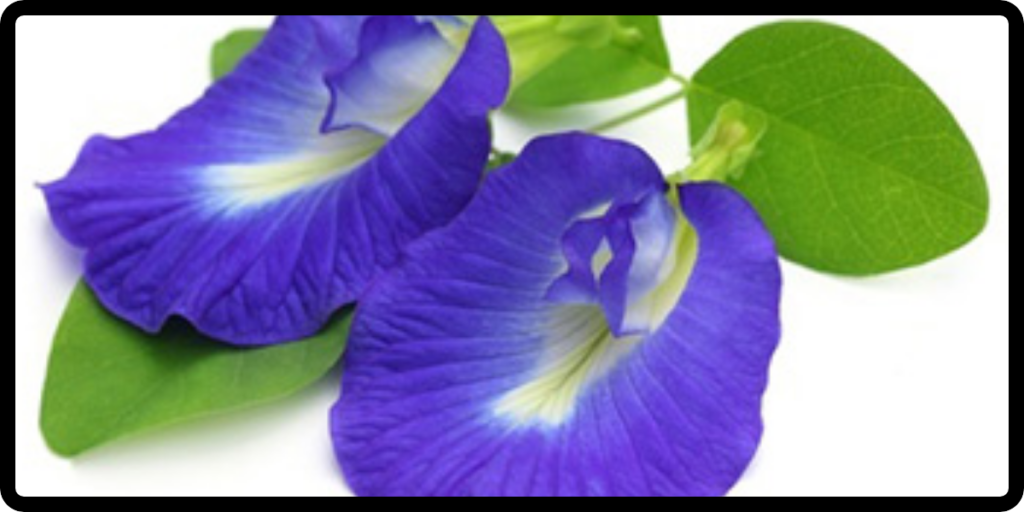
Shankhpushpi (Convolvulus pluricaulis) is an herbaceous plant that is primarily found in India. It has a long history of use in traditional Indian medicine systems, particularly Ayurveda, where it is highly regarded for its potential health benefits.
Shankhpushpi is believed to help with stress relief–
- Botanical Description: Shankhpushpi is a delicate perennial plant with creeping subsidiaries and funnel-shaped white or purple blossoms. It is an affiliate of the family Convolvulaceae.
- Traditional Uses: Shankhpushpi is an herb that is used in Ayurveda to promote mental and cognitive wellness. It has been used for centuries to boost attention span and recall and to lessen nervousness and stress.
- Adaptogenic Properties: Shankhpushpi is classified as an adaptogen, meaning it is believed to help the body adapt to stress and maintain a state of balance, or homeostasis. This property is why it is often used to alleviate stress and anxiety.
- Brain Health: It is commonly used to support brain health and is believed to enhance cognitive abilities, including memory and learning. This makes it a popular choice for students and those seeking to boost mental clarity.
- Antioxidant Properties: Shankhpushpi contains antioxidants that can help combat the harmful effects of oxidative stress in the body. These antioxidants may help protect brain cells and reduce the impact of stress on the body.
- Anti-inflammatory Effects: Inflammation is often associated with stress-related health issues. Some studies suggest that Shankhpushpi may have anti-inflammatory properties, which can be beneficial in managing stress-related inflammation.
- Mood Enhancement: Some individuals report an improvement in mood and emotional well-being when using Shankhpushpi. It may help stabilize mood swings and reduce feelings of anxiety and depression.
- Dosage and Forms: Shankhpushpi comes in powder, pill, and liquid extract forms, among others. It is suggested to obtain counsel from an accredited Ayurvedic practitioner or healthcare expert because the optimal dose may differ depending on the specific ingredient and the needs of the individual.
- Safety and precautions: When taken as prescribed, sankhpushpi is typically seen as safe. Like any herbal therapy, it may not prove appropriate for everyone; therefore, any side effects or dosage combinations should be kept in mind. Before taking Shankhpushpi, always talk to your doctor, especially if you’re pregnant, breastfeeding, or have any underlying medical issues.
In summary, While Shankhpushpi has a long history of traditional use and is considered to possess an assortment of potential health advantages, scientific research on its safety and efficacy continues to be conducted. It is beneficial to get assistance from a qualified physician who can offer tailored advice based on your distinct health needs and circumstances if you are interested in applying Shankhpushpi for its potential positive health effects.
Ashwagandha:
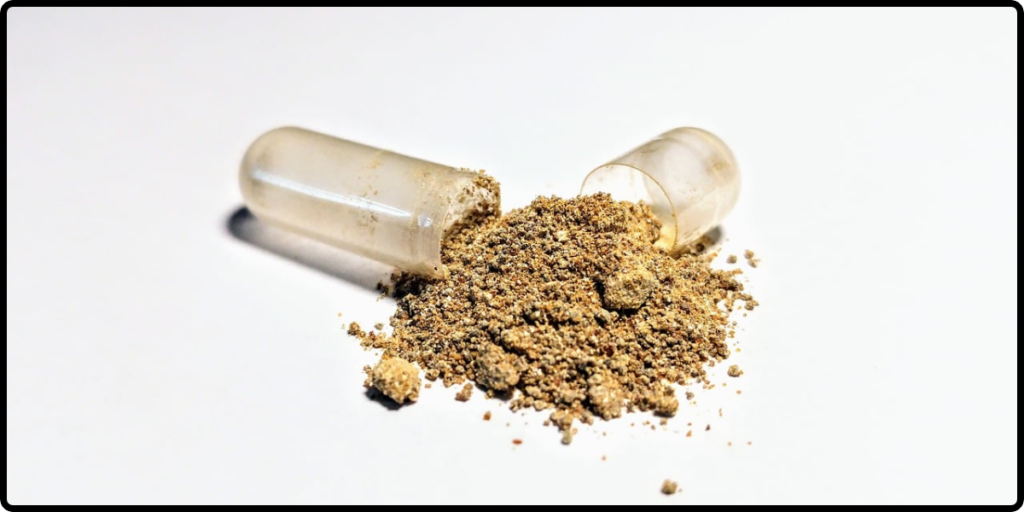
Ashwagandha (Withania somnifera), also known as Indian Ginseng or Winter Cherry, is a versatile and highly regarded herb in traditional Ayurvedic medicine, where it has been used for thousands of years for its numerous health benefits. Ashwagandha is often referred to as an “adaptogen,” which means it helps the body adapt to stress and promote overall well-being.
Ashwagandha can be used as a stress-relief plant.
- Adaptogenic Properties: Ashwagandha offers adaptogenic properties, which means it assists the body in coping with a range of triggers, both emotionally and physically. It may influence how the body responds to stress, boosting its resilience.
- Anxiolytic (anxiety-reducing) Effects: Ashwagandha is well known for its ability to reduce anxiety. By encouraging a sense of tranquility and ease, it can help minimize symptoms of anxiety and nervousness.
- Cortisol Regulation: Ashwagandha has been confirmed to reduce cortisol levels in the body. The principal stress hormone in the body is cortisol, so elevated quantities of it may elevate anxiety and stress.
- Better Sleep: Plenty of people discover that ashwagandha affects the quality of their sleep. It may be faster to unwind and go to sleep by diminishing stress and anxiety.
- Cognitive Function: It is believed that ashwagandha increases cognitive skills such as memory, focus, and mental clarity. When you get over the intellectual challenges imposed due to stress, this can be immensely helpful.
- Energy and vigor: Ashwagandha not only relieves stress but also gives users a feeling of vitality and energy, assisting them to more effectively cope with the demands of everyday existence.
- Support a healthy immune System: Ashwagandha consists of immunity-boosting features that are potentially effective when facing stress when the immune system may be impaired.
- Mood Stabilization: Ashwagandha is believed to have a mood-stabilizing effect and help people monitor their changes in mood and mood swings.
HOW TO USE ASHWAGANDHA FOR STRESS RELIEF:
- Ashwagandha Tea: You can make Ashwagandha tea by steeping Ashwagandha root or powder in hot water. This herbal tea can be consumed regularly for its calming and adaptogenic effects.
- Ashwagandha Tinctures: Ashwagandha extracts in liquid form are available and can be ingested . They give you an efficient way to add Ashwagandha to your usual routine.
- Ayurvedic Formulations: In Ayurveda, Ashwagandha is often used as a key ingredient in herbal formulations designed to promote stress relief and overall well-being.
- Supplements featuring Ashwagandha: Ashwagandha is often offered as capsules, pills, or powder. Use the recommended quantity shown on the product packaging or obtain counsel from a qualified healthcare provider.
In summary, It’s important to note that Ashwagandha should be used in moderation and in consultation with a healthcare provider, especially if you are pregnant, nursing, or taking medications. Ashwagandha can be a valuable tool in your stress management toolkit, but it’s essential to use it safely and according to your specific needs.
Syngonium:
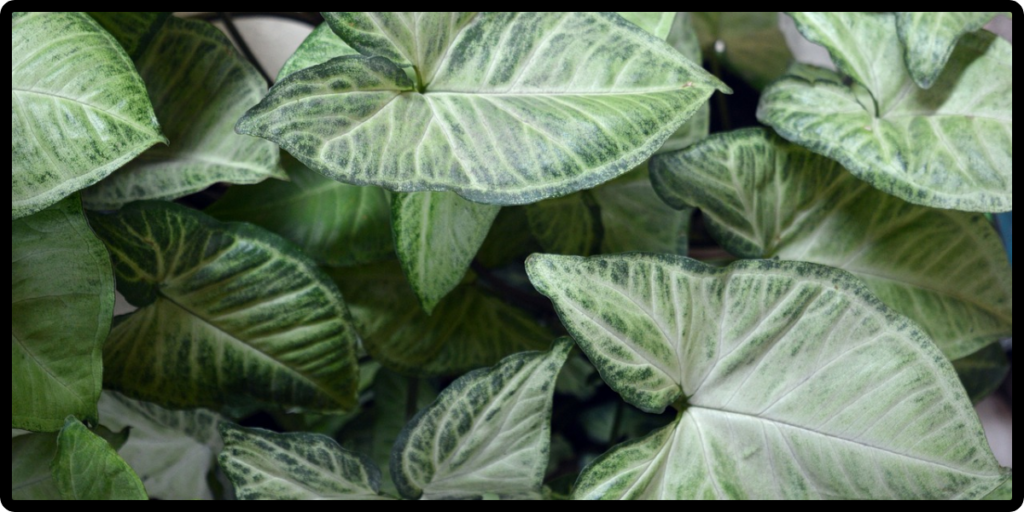
Syngonium (Syngonium podophyllum), commonly known as the Arrowhead Plant or Arrowhead Vine, can indeed serve as a stress-relief plant, primarily by creating a calming and aesthetically pleasing indoor environment.
Syngonium as a stress relief plant:
- Visual Aesthetics: Syngonium’s vibrant, green foliage, usually with striking variegation, can generate an aesthetically pleasing and tranquil environment in your home or business. It is widely accepted that being near foliage helps individuals recover psychologically and diminishes stress.
- Biophilic Benefits: The idea of “biophilia” claims that humans possess an innate appreciation for nature. Inducing this connection via plants like Syngonium in your living area could help you feel calmer and more focused.
- Responsibility and Routine: Caring for a living plant can provide a sense of responsibility and routine, which can be calming and meditative. Engaging with your Syngonium through activities like watering, pruning, and repotting can be a form of mindfulness and stress reduction.
- Air Purification: Syngonium is known for its air-purifying qualities, helping to remove indoor air pollutants like formaldehyde, xylene, and benzene. Cleaner air can contribute to a healthier and more comfortable indoor environment, which can positively impact your mental state.
- Low upkeep: Although Syngonium requires minimal upkeep, it is an ideal option for those who may not have the time or superior planting expertise. You may benefit from greenery without facing more anxiety since it requires minimal management.
- Connection to Nature: Having a Syngonium indoors permits you to preserve a connection with nature, which may be extremely consoling for those who live in high-stress environments or in regions with limited access to green spaces.
- Better Concentration: It has been demonstrated that having plants like Syngonium around you can help you focus and increase your attention endurance. This can be especially beneficial for lowering stress caused by obligations like work or school.
- Mood Enhancement: The presence of indoor plants, including Syngonium, has been linked to improved mood and reduced feelings of anxiety. The visual appeal and natural beauty of the plant can have a positive impact on your emotional well-being.
SYNGONIUM CONSIDERATIONS:
- Light: Provide your Syngonium with bright, indirect light. It can tolerate lower light conditions but may grow slower.
- Watering: Keep the soil consistently moist but not waterlogged. Allow the top inch or so of soil to dry out between waterings.
- Humidity: Syngonium appreciates higher humidity levels. You can mist its leaves or use a humidity tray to create a more suitable environment, especially in dry indoor conditions.
- Pruning: Regularly trim or pinch back the plant to encourage bushier growth and maintain its desired shape.
- Potting: Repot your Syngonium when it outgrows its container, using well-draining potting soil.
- Fertilization: Feed your Syngonium with a balanced, diluted liquid fertilizer during the growing season (spring and summer) to promote healthy growth.
In summary, Syngoniums are versatile and attractive houseplants that can add a touch of greenery and air-purifying qualities to your indoor space. With proper care and attention to its specific needs, you can enjoy the beauty and benefits of this charming plant.
When using stress-relief plants, it’s important to consult with an Ayurvedic practitioner to determine your specific dosha imbalance and receive personalized recommendations. Integrating these herbs into your daily routine, such as through herbal teas, capsules, or powders, can help you manage stress and maintain balance in your mind and body, according to principles.





“I appreciate your perspective on healing plants.you’ve covered a lot information in your blog. *GREAT ARTICLE! I REALLY ENJOYED READING ABOUT HEALING PLANTS*
Pingback: 12 Most Powerful Medicinal Plants with Medicinal Benefits